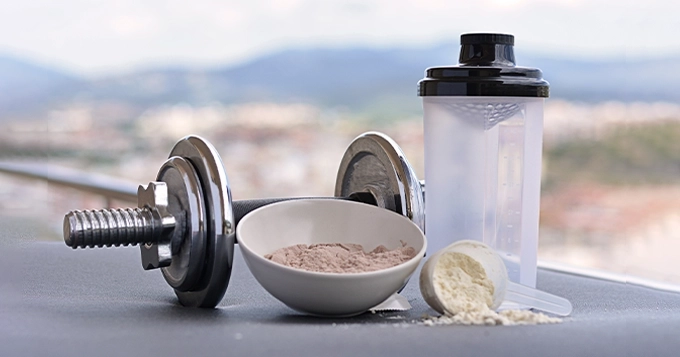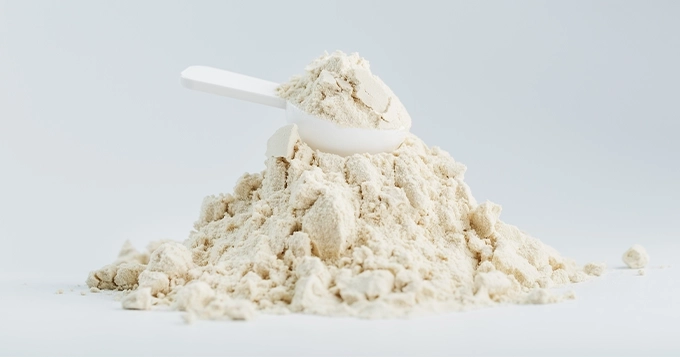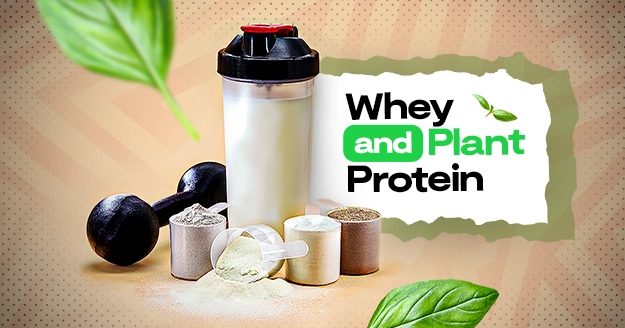Protein is important for building muscles, fixing them after workouts, and keeping your body healthy. Two types of popular protein supplements are whey protein and plant protein. It’s helpful to know the differences between these two so you can choose the one that suits your diet and fitness needs.
Understanding Whey Protein
Whey protein powder comes from milk when it’s being made into cheese. It’s a complete protein because it has all the essential amino acids your body needs but can’t make alone. Whey is absorbed quickly by your body, which makes it great for after a workout when your muscles need to recover. It also has a lot of branched-chain amino acids (BCAAs), especially leucine, which helps your body build muscle.
Advantages of Whey Protein
- Quick Absorption.Whey protein is great for quickly replenishing your body with protein after intense exercise because it gets absorbed quickly.
- Complete Amino Acid Profile.It has all the essential amino acids your body requires, which helps with muscle development and repair.
- High in BCAAs.Whey also has a lot of BCAAs, which are essential for muscle recovery and building lean muscle mass.
- Health Benefits. Whey protein has been studied a lot and is well-known for helping build muscle, aiding recovery after workouts, and assisting with weight management. It also contains unique proteins called bioactive peptides that support a healthy immune function and overall health.
Understanding Plant Protein
Protein can also come from plants like peas, hemp, soy, and rice. While some plant proteins may not have all the essential amino acids your body needs, combining different plant protein sources can provide a complete amino acid profile. This makes plant protein a good choice for people who follow vegetarian or vegan diets, or for those who are lactose intolerant and cannot have dairy protein.
Advantages of Plant Protein
- Digestive Friendliness.Plant protein is easier on the digestive system compared to dairy-based proteins, making it a good option for people who experience discomfort with dairy products.
- Environment-Friendly.Producing plant protein tends to have a lower environmental impact compared to animal-based protein production, which makes it a more sustainable choice for eco-conscious consumers.
- Diverse Options.Plant protein also offers a wide variety of options, allowing individuals to choose protein sources that fit their dietary preferences and needs.
- Health Benefits.Studies have shown that eating plant based proteins can help lower your risk of heart disease, support weight management, and contribute to overall health because they are high in fiber and nutrients. Plant-based proteins are often hypoallergenic and suitable for people with dairy allergies.
Which is better: Plant-Based Protein Powder or Whey Protein Powder?
There are many choices for everyone when it comes to the debate between whey protein and plant based protein. The best option for you will depend on your personal preferences, any dietary restrictions you may have, and your fitness goals.
So, it’s essential to consider these factors and choose the best protein powder.
1. Dietary restrictions. If you have a dairy allergy, are lactose intolerant, or follow a vegan or vegetarian diet, then plant-based protein powder may be a better choice for you.
2. Protein content. Both plant-based protein powder and whey protein contain high amounts of protein per serving, but the exact amount can vary. Some plant-based protein powders may have lower protein content than whey protein, so it’s important to check the label and pick a product that meets your needs.
3. Nutrient profile. Plant-based protein powders often contain additional nutrients like fiber, vitamins, and minerals that are not usually present in whey protein. Whey protein, on the other hand, contains all nine essential amino acids in the right proportions to support muscle growth and repair.
4. Taste and texture. The taste and texture of plant-based protein powders can vary widely depending on the specific ingredients used. Some people like the taste and texture of whey protein, while others prefer the flavor and texture of plant-based protein powders.
Ultimately, whey and plant protein have their unique benefits, and incorporating various protein sources into your diet can contribute to overall health and fitness success.








